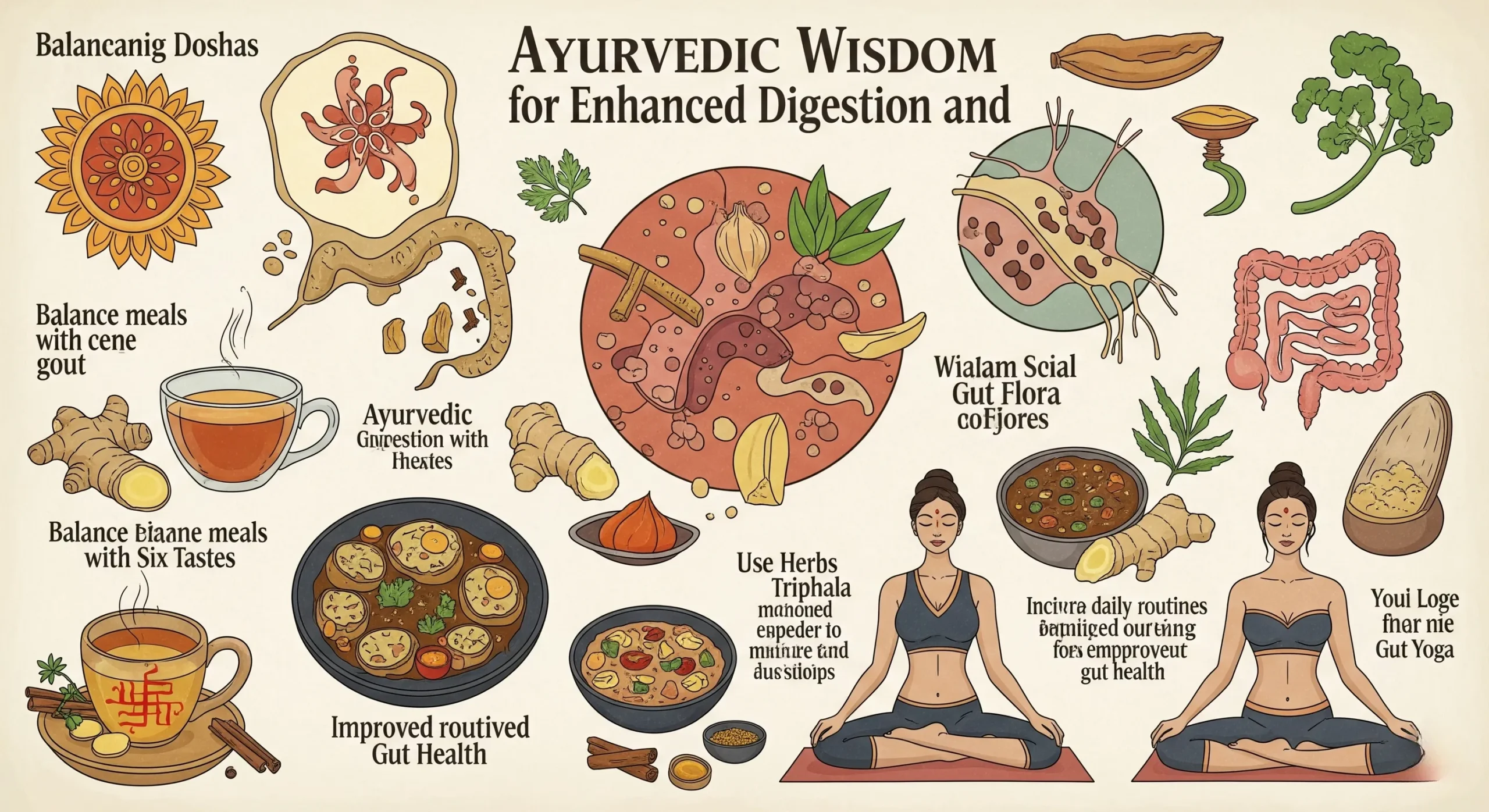8 Ayurvedic Tips for Better Digestion and Gut Health

Have you ever had that gut feeling—literally—that something just feels off? Maybe it’s the bloating after a heavy lunch or that sluggishness that sneaks in post-dinner. We often ignore these signs, brushing them off as nothing. But what if your gut is trying to tell you something important?
In Ayurveda, the gut is more than just an organ—it’s the seat of your health and vitality. It’s where your body begins the sacred work of turning food into energy. When your digestion is off, everything feels a little harder—your mood dips, your skin acts up, and your energy crashes. But there’s good news. Ayurveda, the 5,000-year-old Indian healing science, offers simple, everyday habits that can dramatically improve your digestion and gut health.
This guide isn’t about diets or restrictions. It’s about reconnecting with your body, listening deeply, and choosing gentle, supportive practices. Let’s walk through eight practical, time-tested Ayurvedic tips that have worked wonders for generations—and could be just what your gut needs today.
1. Start Your Day with Warm Water and a Smile
This might sound too simple to be powerful, but trust me—it works. In Ayurveda, digestion starts even before you eat. When you wake up, your digestive system is like a sleepy friend—it needs a gentle nudge, not a jolt.
Drinking warm water first thing in the morning helps flush out toxins (called ama in Ayurveda), wakes up your intestines, and prepares your stomach for food. It’s like giving your gut a warm hug. Add a squeeze of lemon for a cleansing boost, or a slice of ginger if you’re feeling sluggish.
Here’s a quick morning ritual that’s worked wonders for me:
-
1 cup of warm water
-
A pinch of turmeric
-
A few drops of lemon juice
-
Drink slowly and mindfully
This ritual doesn’t just cleanse—it also signals your body that it’s time to transition from rest to action. Bonus tip? Smile while you sip. It sounds cheesy, but smiling activates parasympathetic nerves, relaxing your body and aiding digestion.
| Benefits of Warm Water in the Morning |
|---|
| Flushes toxins from the digestive tract |
| Supports bowel movements |
| Boosts metabolism and energy levels |
| Prepares gut for the day’s meals |
2. Eat According to Your Dosha Type
Here’s where things get personal. Ayurveda teaches that we’re all made of three energies—Vata, Pitta, and Kapha. These doshas affect how we digest food, how we feel, and even how we think.
Understanding your dosha can help you make better food choices. For example:
-
Vata types (dry, light, airy) need warm, grounding foods like soups and stews.
-
Pitta types (hot, intense, fiery) benefit from cooling foods like cucumber, mint, and coconut.
-
Kapha types (heavy, slow, stable) do well with light, spicy foods and bitter greens.
When I discovered I was predominantly Pitta, everything clicked. I stopped eating spicy fried foods and started including more cooling herbs like coriander and fennel. The bloating and acidity I used to battle? Gone.
Eating for your dosha brings your whole system into balance. It’s not about restriction—it’s about nourishment that’s tailor-made for your body.
3. Cook Fresh, Eat Fresh
In our fast-paced world, leftovers seem like a blessing. But according to Ayurveda, food begins to lose its life force (prana) soon after it’s cooked. Eating fresh, warm meals gives your gut the best chance to digest efficiently.
Why does this matter? Think of your digestive system like a fire (agni). Just like fire burns dry wood better than wet logs, your digestion works best with fresh, cooked foods rather than cold, leftover meals from the fridge.
Some simple fresh meal ideas:
-
Khichdi (lentils and rice) with ghee and cumin
-
Lightly spiced vegetable stew
-
Warm herbal teas like cumin-fennel-coriander (CFC tea)
Avoid microwaving meals when possible—it disturbs the subtle energies in food. If you can, cook small portions and eat them mindfully. Your digestion and gut health will thank you.
4. Chew Like Your Life Depends on It (Because It Kind of Does)
This one changed everything for me. We rush. We multitask. We scroll while we eat. But digestion doesn’t begin in the stomach—it starts in your mouth.
Chewing your food thoroughly breaks it down, mixes it with saliva (rich in enzymes), and sends a message to your stomach to get ready. Ayurveda says: Drink your food, and eat your water. Meaning? Chew until the food is almost liquid. Sip water in small sips—never gulp.
Since slowing down my meals, I’ve noticed:
-
Less bloating and gas
-
Better energy after eating
-
A calmer, more present mindset
Make your meal a ritual. Put your phone away. Sit down. Say a small prayer of thanks. And chew like each bite is a conversation with your body. Because it is.
5. Spices Are More Than Flavor—They’re Medicine
Indian kitchens are treasure troves of healing. Turmeric, cumin, fennel, coriander, ginger—these aren’t just ingredients. They’re digestive allies.
Here are some of Ayurveda’s favorite gut-friendly spices:
-
Cumin: Enhances digestion and reduces gas
-
Fennel: Soothes the gut and relieves bloating
-
Ginger: Warms the digestive fire and fights nausea
-
Turmeric: Reduces inflammation and supports the liver
-
Ajwain (carom seeds): Powerful for indigestion
I keep a small spice mix at home—equal parts cumin, coriander, and fennel. I boil a teaspoon in water and sip it after meals. It’s soothing, aromatic, and feels like a warm hug from grandma.
The best part? These spices are inexpensive, easy to find, and safe for everyday use.
6. Don’t Mix Incompatible Foods
This one’s an eye-opener. Ever wondered why that fruit yogurt or cheese and fish combo left you with a tummy ache? Ayurveda has a concept called viruddha ahara—which means incompatible foods.
Some common bad food combinations include:
-
Milk with citrus or sour fruits
-
Fish with dairy
-
Bananas with milk
-
Nightshades (like tomatoes) with yogurt
These combinations confuse your digestive enzymes. They create toxins, cause bloating, and weaken your gut health over time.
Since cutting out incompatible pairings, my digestion feels lighter. Meals don’t sit heavy anymore. Ayurveda doesn’t say never eat tasty things—it just says, eat smart. A little awareness goes a long way.
7. Eat Your Main Meal at Noon
Your gut has a clock. And its strongest time is midday—when the sun is highest. Ayurveda recommends making lunch your biggest, most nourishing meal of the day.
Why? Because your digestive fire (agni) mirrors the sun. At noon, your agni is blazing. It’s the perfect time to eat heavier foods like grains, beans, and proteins.
I used to skip lunch or have a quick salad. But since switching to a warm, wholesome midday meal, my energy lasts longer, my sugar cravings are down, and I feel centered all day.
Here’s a sample Ayurvedic lunch plate:
-
A bowl of dal (lentils)
-
Rice or chapati
-
Seasonal cooked veggies
-
A spoon of ghee
-
Fresh coriander garnish
Keep dinner light—think soup or steamed veggies—and finish eating before 7 PM. Your sleep and digestion will both improve.
8. Prioritize Rest and Routine
This last tip goes beyond food. Because even the healthiest meals can’t fix a lifestyle that’s chaotic, stressful, and out of rhythm.
Ayurveda teaches balance through routine (dinacharya). Sleeping late, eating at odd hours, skipping rest—these all disturb your gut’s natural flow.
Some simple routines that helped me:
-
Waking up and sleeping at the same time
-
Eating meals at consistent hours
-
Taking short walks after eating (great for digestion!)
-
Practicing mindfulness or gentle yoga
Stress directly affects the gut. When you’re anxious, digestion slows down. When you’re calm, it flows. Ayurveda doesn’t treat the gut as separate—it sees it as part of your emotional and energetic system.
So, make space for stillness. Listen to your body. Rest is not laziness—it’s medicine.
Final Thoughts: Your Gut, Your Guide
You don’t have to overhaul your life overnight. Just start small. Sip warm water in the morning. Chew your food. Use healing spices. Honor your gut.
These Ayurvedic tips for digestion and gut health are not fads—they’re time-tested truths. They connect you to the wisdom of your ancestors and the rhythm of nature.
In the end, your gut isn’t just about food. It’s about how you digest life.
